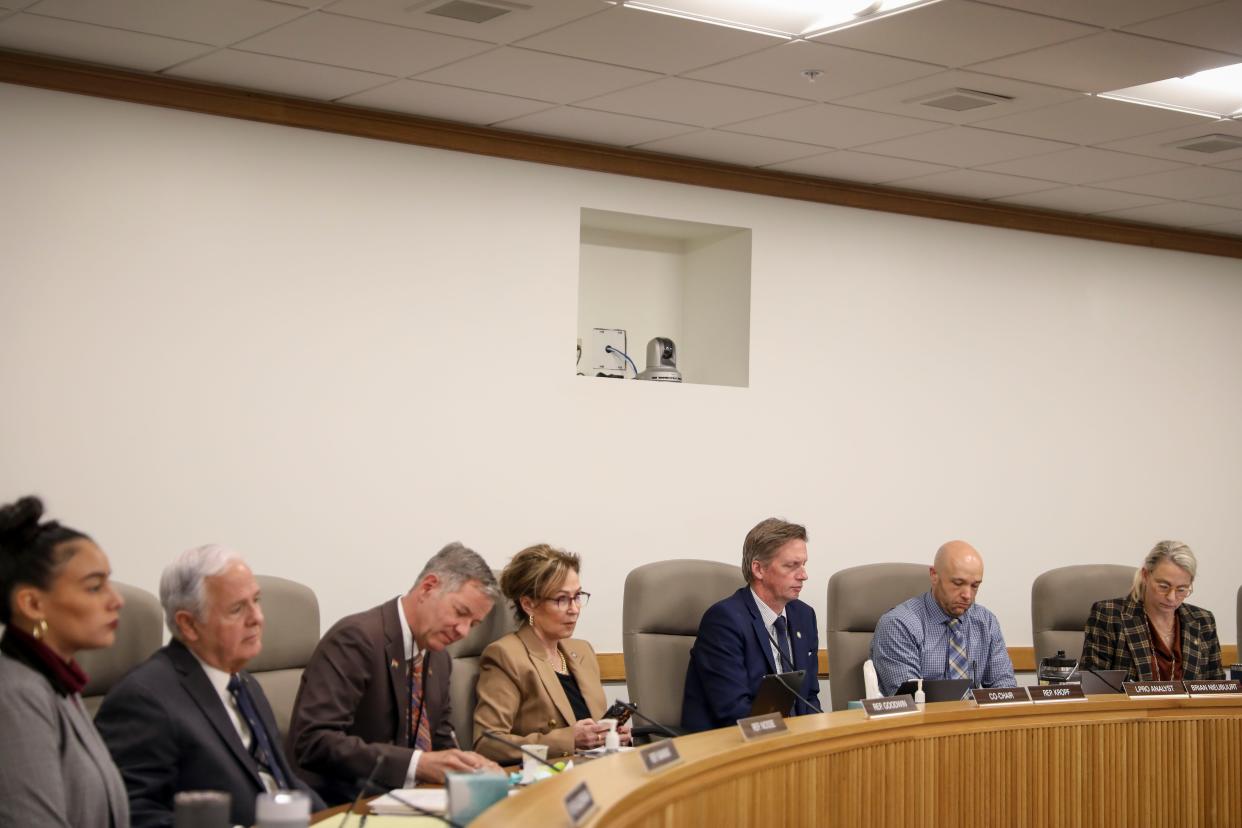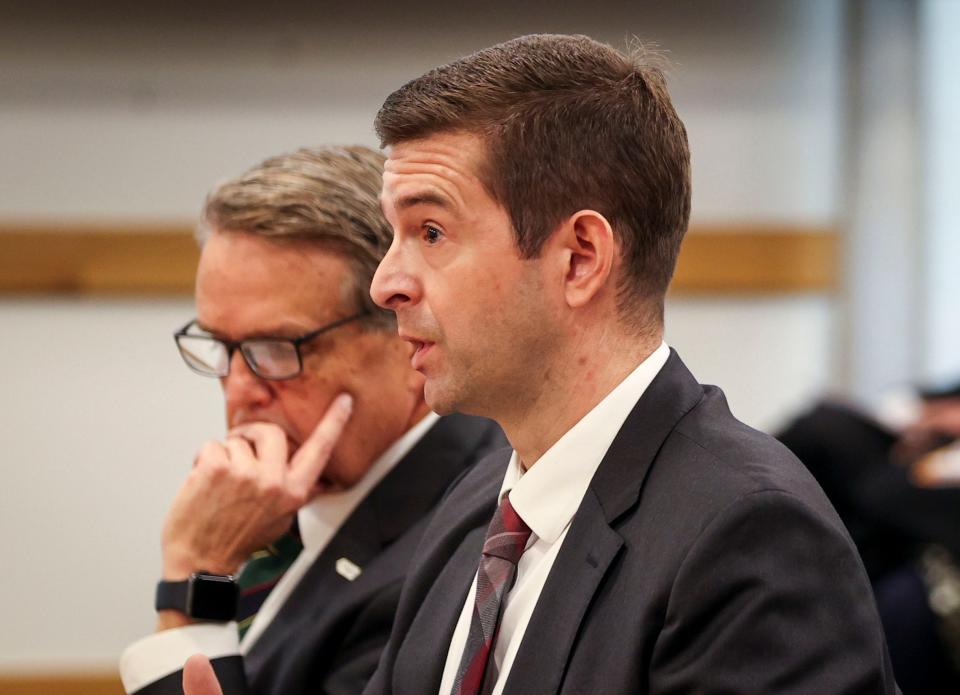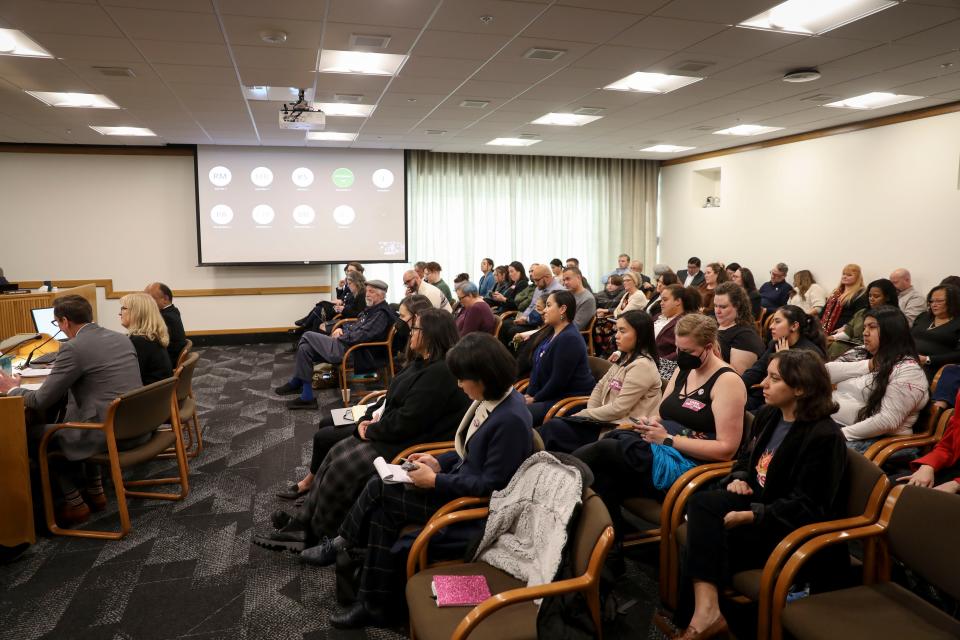Lawmakers' searching for solutions to Oregon's drug addiction crisis hear sobering stats

- Oops!Something went wrong.Please try again later.
Oregon's Measure 110 to decriminalize possession of small amounts of drugs may not have created the state's addiction or mental health crises, but it has exacerbated problems, lawmakers charged with introducing policy suggestions to respond to the crisis were told Monday.
Just 1% of 6,510 Oregonians cited under Measure 110 have had an assessment filed to dismiss their charges, the lawmakers were told. The law has allocated $265 million toward drug treatment services although the implementation of the measure was rocky, as a state audit outlined.
“It’s not OK to see people slowly commit suicide on the streets because they can’t get care,” Clackamas County Commissioner Ben West told the Legislature's Joint Committee on Addiction and Community Safety Response. “It’s not OK for this to be our new normal."
Hundreds of Oregonians submitted testimony before Monday's third meeting of the committee, which is charged with introducing policy suggestions to respond to the crisis.
The Centers for Disease Control and Prevention predicts there will have been more than 1,500 drug overdose deaths in Oregon from June 2022 to June 2023, a 28% increase compared to 2022.
Dr. Todd Korthuis, a professor of medicine at the Oregon Health and Science University, shared the data and other grim statistics, including the growth in fentanyl-related deaths.
Korthuis also talked about the results from a survey of rural Oregonians, in which 98% of drug users reported using opioids with methamphetamine, a practice that triples the odds of overdose.
Youth in Oregon also are increasingly in danger, he warned. Oregon now has the fastest-growing youth drug death rate in the country, he said. Korthuis pointed to research presented last month showing the Oregon drug-induced death growth from 2018 to 2022 was 550% in 15 to 19-year-olds.
While suggestions varied, lawmakers and those providing testimony agreed lawmakers must make changes during the 2024 session that begins in February.
A variety of proposals to change Oregon Measure 110
Lawmakers heard a variety of proposals on how to change Measure 110. Some of those pitches were:
Washington County District Attorney Kevin Barton proposed a “surgical use of the criminal justice system” offering three pathways for cited drug users including pre-booking diversions, court diversions similar to drunk-driving diversions, and traditional probation and supervision in which completed treatment would mean automatic expungement of records.
Portland Mayor Ted Wheeler said law enforcement needs to be allowed to stop public consumption and make people feel safe. He urged prohibition of public consumption and the increase of substance use disorder treatment and first responder prioritized beds.
Criminalizing possession of hard drugs again.
Requiring and compelling drug treatment for users instead of relying entirely on voluntary treatment.
Allowing law enforcement to confiscate drugs or disrupt public use.

"On the one hand, people need to be held accountable for their abuse of street drugs, which leads so many of them to commit crimes to feed their addictions," Rep. Kevin Mannix, R-Salem, said in a statement after Monday's meeting. "On the other hand, we need to dramatically reform our drug rehabilitation delivery system so that those who are addicted can promptly receive comprehensive treatment which will put them on the road to recovery.”
Law enforcement officials need lawmakers to return more tools to support recovery, and recovery facilities need to be built out, added Rep. Christine Goodwin, R-Canyonville. Both Mannix and Goodwin sit on the committee.
No to criminalization of drugs
If arrests were the solution, the drug crisis would have been over already, said one speaker. Instead, further investment in treatment and fewer barriers are needed.
Supporters of Measure 110 also urged the public to be more patient.
"It took us time to get here and it'll take time to work," said Larry Turner, founder and president of Fresh Out Community Based Reentry Program, which offers resources to formerly incarcerated African American individuals and is a recipient of Measure 110 funds. According to Oregon Health Authority data, the program has received at least $494,000.

Ron Williams, a member of the Measure 110 Oversight & Accountability Council, said the council has submitted a roadmap for policy changes to address Measure 110 changes that do not include recriminalization.
"Arresting people with addiction is cruel, it's wrong and it's ineffective," Williams said.
Speakers said returning to the way things worked before Measure 110 would not be an effective solution.
Grant Hartley, a public defender with the Multnomah County office of Metropolitan Public Defender, said misinformation and "collective impatience" ignore that criminalization is impractical.
The state already was in a public defense crisis prior to Measure 110's passage. There are nearly 3,000 people in the Oregon Circuit Court system without representation according to the latest data. Of those, 89 remain in custody.
Other solutions to addiction
Before public comment, lawmakers learned more about ways to treat drug addiction including Medication Assisted Treatment. The use of MAT has been increasing in Oregon jails, according to testimony.
Sgt. Marie Gainer described Lincoln County Jail's MAT program, which includes drug testing, virtual visits and suboxone treatment to assist those addicted to opioids.
Jamie Russell, the jail commander in Lincoln County, said he had informally surveyed 24 Oregon jails including Lincoln County's. Of those 24, 11 do not currently have a MAT program but two maintain medication for individuals actively participating in a program before their incarceration and the remaining nine have plans to implement MAT programs as soon as funding becomes available, he said.
In Marion County, Measure 110 helped fund a MAT program in the jail that launched in January and provides an on-site provider two times a week, according to Dr. Brian Dawson, a physician with Ideal Option, a MAT program provider and Measure 110 fund recipient of at least $924,000.
Since the program's launch, 444 people in Marion County Jail have started MAT, Dawson said.
Additional meetings for public input
Sen. Kate Lieber, D-Beaverton, and Rep. Jason Kropf, D-Bend, the co-chairs of the committee, said they will review ideas and public testimony in the coming weeks and months to build a response.
Lieber said in a prepared statement that she was frustrated and worried about the crisis but hopeful about solutions "that will make a real, immediate impact."
"The testimony we heard today showed Oregonians have core, shared values that unite us," Kropf said in the same press release. "We all want cleaner streets, safer communities and a drug treatment system that meets people where they are.”
The public will be able to comment in other not-yet-scheduled committee meetings. They also can submit testimony online until 1 p.m. Wednesday.
To submit written comment, email JACSR.exhibits@oregonlegislature.gov with the specific agenda topic in the subject line or send mail to: Joint Interim Committee on Addiction and Community Safety Response900 Court St. NE, Room 453, Salem, OR, 97301.
The interim committee will meet one more time before the start of February's legislative session.
Dianne Lugo covers the Oregon Legislature for the Statesman Journal. Reach her at dlugo@statesmanjournal.com or on X/Twitter at @diannelugo
This article originally appeared on Salem Statesman Journal: Oregon lawmakers discuss drug addiction crisis, Measure 110

